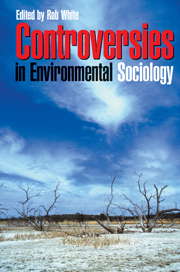Book contents
- Frontmatter
- Contents
- Tables and Figures
- Author Notes
- Abbreviations
- Introduction: Sociology, Society and the Environment
- PART I SOCIAL PERSPECTIVES
- 1 Old Traditions and New Ages: Religions and Environments
- 2 Social Nature
- 3 Gender, Eco-Feminism and the Environment
- 4 Animals, ‘Nature’ and Human Interests
- 5 Governing Environmental Harms in a Risk Society
- PART II SOCIAL TRENDS
- PART III SOCIAL ISSUES
- Index
- References
2 - Social Nature
The Environmental Challenge to Mainstream Social Theory
Published online by Cambridge University Press: 05 June 2012
- Frontmatter
- Contents
- Tables and Figures
- Author Notes
- Abbreviations
- Introduction: Sociology, Society and the Environment
- PART I SOCIAL PERSPECTIVES
- 1 Old Traditions and New Ages: Religions and Environments
- 2 Social Nature
- 3 Gender, Eco-Feminism and the Environment
- 4 Animals, ‘Nature’ and Human Interests
- 5 Governing Environmental Harms in a Risk Society
- PART II SOCIAL TRENDS
- PART III SOCIAL ISSUES
- Index
- References
Summary
Until recently, sociological theory has had little to say about nature or the environment. Reflecting its origins in the social transformations of the Industrial and French Revolutions, sociological theory adopted the modernist ideology that through the application of labour and creativity humankind could emancipate itself from the animalistic fight for survival characteristic of other species (Latour 1993). The blowtorch of sociological analysis was turned towards a host of institutions ranging from religion and art to education and class relations in order to illuminate and confront relationships of domination and control. But nature, and the multitude of organisms, substances and patterns that comprise it, were taken for granted as passive participants in this great human drama. Under the sway of modern science and technology, the environment had lost its mystical and autonomous status and become a blank canvas onto which human aspirations and projects could be painted.
With hindsight, the naivety, if not arrogance, of modernist ideology seems obvious. Social struggles over genetic engineering, nuclear proliferation, toxic waste, food safety, environmental justice, and so on, blur the false distinction between social and environmental issues (Latour 1993). These struggles refuse to comply with neat divisions of labour between the social and the natural sciences and force environmental movements to extend their concerns beyond traditional issues of ‘wilderness’ preservation and species conservation (see Pepper 1984) to include indigenous peoples' rights, rural livelihoods, public health and the use of urban space (Lockie 2004).
- Type
- Chapter
- Information
- Controversies in Environmental Sociology , pp. 26 - 42Publisher: Cambridge University PressPrint publication year: 2004
References
- 6
- Cited by



